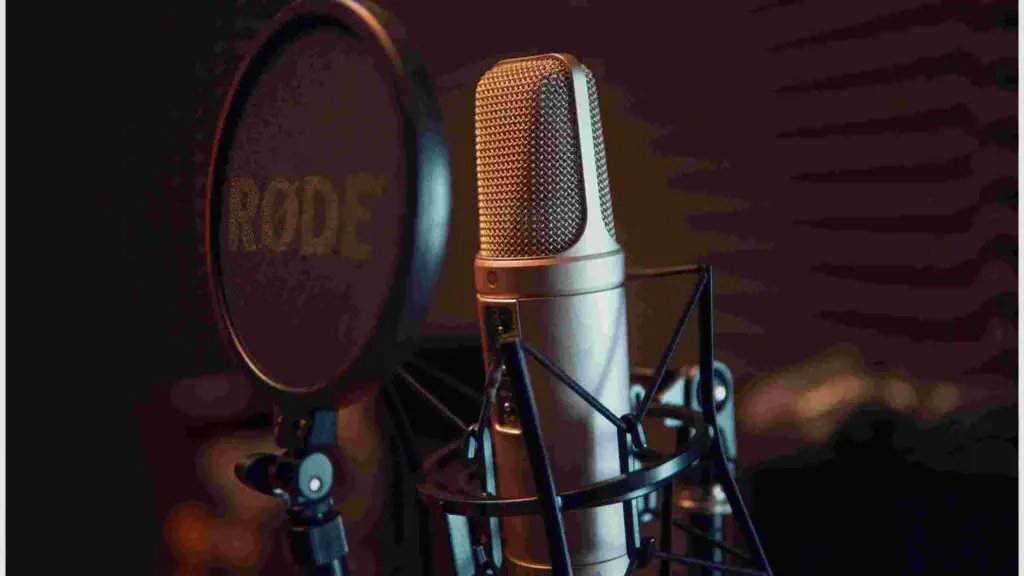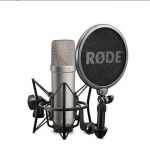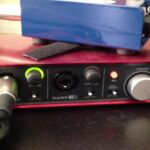The best microphone for interviews is the shure sm58 due to its excellent sound quality and reliable performance. The shure sm58 is a top choice for interviews as it captures clear and crisp audio, ensuring that every word is heard with utmost clarity.
Its sturdy construction, built-in wind and noise filter, and directional pickup pattern make it ideal for interview settings, allowing for focused audio capture and minimizing background noise interference.
Additionally, the shure sm58 is a versatile microphone that can be used for various other purposes including live performances, podcasts, and studio recordings, making it a valuable investment for professionals in the field.
When it comes to interviews, the shure sm58 is unrivaled in delivering exceptional sound quality and reliability.

Table of Contents
Factors To Consider When Choosing A Microphone
Purpose And Setting Of The Interview
- The purpose of the interview: Before selecting a microphone for interviews, it is essential to consider the purpose of the interviews you’ll be conducting. Is it for a podcast, video recording, or a radio show? Determining the purpose will help you understand the specific requirements for the microphone.
- The setting of the interview: The environment where the interviews will take place plays a crucial role in microphone selection. Will the interviews be conducted indoors or outdoors? Will there be background noise or echo in the room? Understanding the setting will enable you to choose a microphone that can effectively capture clear audio in that specific environment.
Microphone Types And Their Pros And Cons
Dynamic microphones:
- Pros: Ideal for recording interviews in noisy environments due to their ability to minimize background noise. They are durable and more affordable than other types of microphones.
- Cons: They often have a narrower frequency response range compared to other microphones, which may lead to a less detailed sound quality.
Condenser microphones:
- Pros: Known for their excellent sensitivity, condenser microphones capture a wide range of audio frequencies, resulting in detailed and high-quality recordings. They are perfect for indoor interviews conducted in controlled environments.
- Cons: Condenser microphones are more sensitive to background noise and require a power source, either from batteries or an external power supply. They are also generally more expensive than dynamic microphones.
Lavalier microphones:
- Pros: Lavalier microphones, also known as lapel microphones, are small and discreet, making them suitable for on-camera interviews where visibility is important. They offer hands-free operation and provide a consistent sound quality for the interviewee.
- Cons: Due to their small size, lavalier microphones may lack the same level of sound quality as larger microphones. They are also more prone to picking up clothing rustling or other unwanted noise if not properly positioned.
Budget And Price Range
- Consider your budget constraint: When choosing a microphone for interviews, it’s important to determine your budget and price range. Microphone prices can vary significantly, so establishing a budget can help narrow down your options and prevent overspending.
- Compare microphone prices and features: It’s important to research and compare different microphone models within your budget range. Look for microphone brands that offer a balance between price and quality. Consider the features that are essential for your interview purposes and find a microphone that meets your requirements without breaking the bank.
- Don’t overlook the overall value: While it’s tempting to focus solely on price, it’s crucial to consider the overall value the microphone offers. A slightly higher-priced microphone may provide better durability, sound quality, and additional features, making it a worthwhile investment in the long run.
Remember, selecting the best microphone for interviews depends on the purpose and setting of the interview, the microphone type and its pros and cons, and your budget and price range. By considering these factors, you can make an informed decision and ensure that your interviews are captured with clarity and professionalism.
Top 5 Best Microphones For Interviews
When it comes to conducting interviews, having the right microphone can make a world of difference in terms of audio quality and clarity. Whether you’re a journalist, podcaster, or content creator, capturing clear and professional-sounding audio is essential. In this section, we’ll explore the top 5 microphones that excel in interview settings.
From dynamic microphones to wireless handheld options, these microphones offer exceptional performance and reliability.
Dynamic Microphone: Rode Reporter
- Designed specifically for interviews and reporting
- Features a handheld design that offers easy maneuverability
- Provides excellent background noise rejection for cleaner audio
- Equipped with an internal foam windscreen to minimize wind noise
- Captures crystal-clear sound with a frequency response tailored for voice
Lavalier Microphone: Sennheiser Me 2-Ii
- Lightweight and discreet microphone that can be clipped onto clothing
- Delivers high-quality audio with exceptional speech intelligibility
- Offers a broad frequency response for capturing accurate sound
- Features an omnidirectional pickup pattern for consistent audio even with movement
- Ideal for interviews where the microphone needs to be inconspicuous
Shotgun Microphone: Audio-Technica At897
- Excels at capturing focused audio from a distance
- Features a narrow pickup pattern that reduces unwanted ambient noise
- Provides clear and natural sound reproduction
- Long interference tube allows for precise audio targeting
- Perfect for interviews where the subject is further away from the microphone
Usb Microphone: Blue Yeti Pro
- Offers versatility with multiple pickup patterns (cardioid, bidirectional, omnidirectional, stereo)
- Provides exceptional audio quality with a wide frequency response range
- Equipped with built-in headphone monitoring for real-time audio monitoring
- Ideal for conducting interviews remotely via video calls or online platforms
- Compatible with both mac and pc systems for ease of use
Wireless Handheld Microphone: Shure Slx2/Sm58
- Provides freedom of movement during interviews
- Features a rugged construction for durability in demanding environments
- Offers a cardioid pickup pattern for excellent off-axis noise rejection
- Delivers clear and natural sound reproduction
- Perfect for interviews where mobility is crucial
Choosing the best microphone for interviews depends on your specific needs and preferences. Consider factors such as the environment, desired audio quality, and mobility requirements when making your decision. With any of these top 5 microphones, you can ensure professional-grade audio for your interviews.
Best Microphone For Virtual Interviews
Choosing the right microphone for virtual interviews depends on your budget and preferences. A solid option is the Blue Yeti USB microphone—it’s easy to set up, provides good sound quality, and won’t break the bank. If you’re willing to invest a bit more, the Audio-Technica ATR2100x-USB offers both USB and XLR connections, giving you flexibility for different setups. Remember, good audio can make a big difference in virtual interviews!
Best Microphone For Street Interviews
For street interviews, you’d want a microphone that’s portable, durable, and capable of capturing clear audio in various outdoor environments. The Rode smartLav+ and the Shure MV88 are great options. The smartLav+ is a lavalier microphone that clips onto clothing, offering hands-free operation, while the MV88 is a compact, directional microphone that plugs directly into your smartphone. Both deliver excellent sound quality and are designed to handle different ambient conditions you might encounter on the streets.
Interview Microphone For Mobile
Looking for a good mobile interview microphone, huh? Smart move! A solid microphone can make a world of difference. If you’re on a budget, the Rode smartLav+ is a popular choice. It’s a lavalier microphone that works great with mobile devices. If you’re willing to invest a bit more, the Shure MV88 is a versatile and high-quality option, especially if you’re into recording on-the-go. What’s the occasion for the interviews?
Comparison And Analysis
Sound Quality And Clarity:
- The most crucial factor to consider when choosing a microphone for interviews is sound quality and clarity. After all, you want your audience to hear every word with utmost clarity.
- A high-quality microphone ensures that the interviewer’s voice is captured with exceptional precision, enhancing the overall listening experience.
- The microphone should produce clear and natural sound, free from any distortions or background noise that might distract from the conversation.
- Look for a microphone that offers a wide frequency response range to capture all the nuances of speech and deliver crisp, professional-sounding audio.
- Additionally, consider microphones with built-in pop filters to minimize plosive sounds that can occur when pronouncing words with hard consonants.
Durability And Portability:
- For interviews in various locations and situations, durability and portability are crucial aspects to consider. Look for a microphone that is built to withstand frequent use and transportation.
- Opt for microphones made from sturdy materials such as metal or high-quality plastic to ensure longevity.
- Consider a compact and lightweight design that is easy to carry around without compromising on performance.
- Some microphones come with protective cases or pouches, making them even more convenient to transport without the risk of damage.
Noise-Canceling Features:
- When recording interviews, it’s essential to have a microphone that can effectively minimize background noise.
- Look for microphones with noise-canceling features such as built-in noise reduction technology or directional pickup patterns.
- Directional microphones, such as cardioid or supercardioid microphones, focus on capturing sound from the front while reducing noise from the sides and rear.
- Additionally, consider microphones with shock mounts or suspension systems to minimize handling noise.
Connectivity And Compatibility:
- The microphone you choose should be compatible with your recording device or equipment.
- Ensure that the microphone has the appropriate connectors, whether it’s a usb or xlr connection, to fit your recording setup.
- Usb microphones are convenient as they can be plugged directly into your computer or mobile device without the need for additional audio interfaces.
- If you prefer a more professional setup, xlr microphones allow for flexibility and compatibility with a wide range of audio equipment.
Cost-Effectiveness:
- Balancing quality and budget is essential when considering a microphone for interviews. While high-end microphones offer exceptional performance, they might be cost-prohibitive for some.
- Consider the overall value for money, considering factors like build quality, sound performance, and additional features.
- It’s important to find a microphone that offers a good balance between cost and performance without compromising on essential features.
- Research and compare prices, read reviews, and seek recommendations to find the best microphone within your budget.
Remember, choosing the best microphone for interviews is subjective, as it depends on individual preferences and requirements. Consider the specific needs of your interviews and prioritize the factors that matter most to you.
Tips For Optimal Interview Audio Recording
Microphone Placement And Distance:
- Place the microphone close to the speaker to ensure clear and high-quality audio recording.
- Maintain a consistent distance between the microphone and the speaker throughout the interview.
- Avoid placing the microphone too close to the speaker’s mouth to prevent distortion.
- Experiment with different microphone positions to find the optimal placement for capturing the best sound.
Room Acoustics And Background Noise Control:
- Choose a quiet location for the interview to minimize background noise interference.
- Consider using a room with good acoustics, such as one with carpeted floors or soundproofing.
- Reduce echo and reverberations by using acoustic panels or adding soft furnishings to the room.
- Use a directional microphone or a microphone with noise cancellation features to minimize unwanted noise.
Proper Handling And Maintenance:
- Familiarize yourself with the microphone’s manual and follow the manufacturer’s guidelines for handling and maintenance.
- Hold the microphone steady during the interview to avoid any handling noise.
- Clean the microphone regularly using a soft cloth to remove dirt and debris.
- Store the microphone in a protective case or cover when not in use to prevent damage.
Using Pop Filters And Windshields:
- Attach a pop filter to the microphone to reduce plosive sounds such as “p” and “b” sounds.
- Position the pop filter a few inches away from the microphone to effectively prevent unwanted popping sounds.
- Consider using a windshield or foam cover to minimize wind noise during outdoor interviews or when working in windy conditions.
- Check for any tears or damages in the pop filter or windshield and replace if necessary.
Recording And Editing Techniques:
- Use a high-quality audio recording device or software for capturing the interview.
- Set the recording levels correctly to prevent clipping or distortion in the audio.
- Monitor the audio levels during the interview to ensure optimal recording quality.
- Edit the audio file after the interview to remove any background noise, adjust volume levels, and enhance the overall sound quality.
Remember, capturing optimal interview audio recording requires attention to microphone placement, room acoustics, proper handling and maintenance, the use of pop filters and windshields, as well as employing effective recording and editing techniques. Taking these factors into consideration will help you achieve clear and professional-sounding interviews.
Interview Microphone Clip-On
Are you looking for a clip-on microphone for interviews? There are plenty of options out there. What specific features or requirements do you have in mind?
Frequently Asked Questions For Best Microphone For Interviews
What Is The Best Microphone For Interviews?
The best microphone for interviews is the shure sm58. It offers excellent sound quality, durability, and noise cancellation. Its built-in pop filter helps reduce plosive sounds and improves the overall recording quality. Additionally, the sm58’s design makes it easy to hold and use during interviews, making it the top choice for professionals.
Are Usb Microphones Good For Interviews?
Yes, usb microphones are good for interviews. They are easy to set up and use, eliminating the need for additional audio interfaces. Usb microphones also have great sound quality and are typically plug-and-play, making them ideal for on-the-go interviews. However, for professional interviews, xlr microphones are often preferred for their higher audio quality and versatility.
What Features Should I Look For In A Microphone For Interviews?
When choosing a microphone for interviews, consider features such as excellent sound quality, noise cancellation, durability, and ease of use. Look for microphones with built-in pop filters to reduce plosive sounds and those that can handle a wide range of frequencies.
Portability and compatibility with different recording devices are also important factors to consider.
What type of mic is best for an interview in a farm field?
For a farm field interview, you’d want a microphone that can pick up clear audio while minimizing background noise like wind or machinery. A good choice might be a shotgun microphone with a windscreen to reduce wind interference. These mics are highly directional, focusing on sound from a specific direction, which can be handy in outdoor settings. Just make sure it’s compatible with your recording device, and you should be good to go!
What would be the best microphone to use if the cameraman is interviewing someone?
For interviews, you’d want a microphone that captures clear and focused audio. A shotgun microphone is a great choice in this scenario. It’s designed to pick up sound in a specific direction, minimizing background noise and capturing the speaker’s voice effectively. Brands like Rode and Sennheiser offer excellent shotgun microphones that are popular among filmmakers and interviewers. Just make sure it’s compatible with your recording equipment! Anything else you’d like to know?
Also Read: Best Condenser Mic Under 200
Conclusion
To select the best microphone for interviews, it is essential to consider various factors such as sound quality, durability, and portability. The shure sm58 is a top choice, renowned for its exceptional sound reproduction and reliability. Its cardioid pickup pattern effectively minimizes background noise, making it ideal for interviews in any setting.
Another excellent option is the rode ntg3, known for its professional-grade audio capture and superior build quality. It is particularly suitable for outdoor interviews due to its resistance to moisture, making it a reliable choice even in challenging conditions. For those seeking a budget-friendly option without compromising on performance, the audio-technica atr2100 is a versatile microphone that delivers clear and crisp audio.
Its usb and xlr outputs offer flexibility and compatibility with various devices. Ultimately, the best microphone for interviews depends on individual preferences and requirements, but the shure sm58, rode ntg3, and audio-technica atr2100 are all exceptional choices worth considering.

Williams Kane is a blogger and writer. He’s passionate about writing and connecting with the community, especially when it comes to sharing his ideas through writing.
I am a versatile author with a passion for exploring a wide range of topics on our multi-niche website. With a background in research and a love for writing, I bring a unique blend of expertise to our platform.
My journey began in the world of science, where I earned a degree in biology and developed a deep fascination for the natural world. This background enables me to delve into topics related to ecology, environmental conservation, and the wonders of the animal kingdom.
However, my curiosity knows no bounds, and I have ventured into various other niches as well. From technology trends and digital innovations to health and wellness tips, I strive to provide well-researched and engaging content that informs and entertains our diverse audience.
Furthermore, my dedication to staying current with the latest developments in each niche ensures that our readers receive up-to-date and reliable information. Whether it’s deciphering complex scientific concepts or simplifying tech jargon, I take pride in making complex subjects accessible to all.
Join me on our multi-niche journey, where we explore the depths of knowledge and share insights on a multitude of topics to inspire, educate, and entertain.



